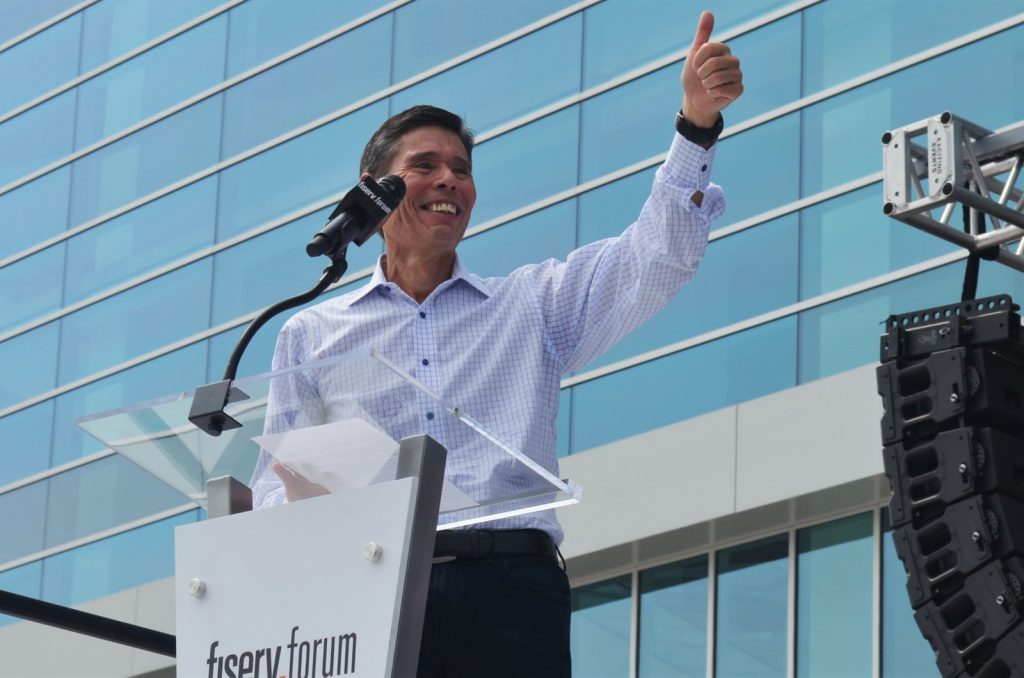CEO Pay Has Risen 1,167% Since 1978
That’s 85 times faster than rise in average workers’ pay, new report finds.

Fiserv CEO Jeffrey Yabuki speaking at the Fiserv Forum ribbon cutting. File photo by Jack Fennimore.
The rich are getting richer. And richer.
A new report by the liberal Economic Policy Institute shows that CEO compensation at the top 350 companies in America grew to $21.3 million in 2019, which was $2.6 million or 14 percent higher than in 2018.
With dips after both the internet stock bubble collapsed in 2000 and the Great Recession of 2008, CEO pay has bounced back and continued upward and was was 1,167 percent higher in 2019 than in 1978. During this same period there was “a painfully slow 13.7% growth in the typical worker’s compensation,” the report found.
As a result the CEO-to-average-worker pay ratio was 320-to-1 in 2019, which was “far higher than the ratios in earlier years: 118-to-1 in 1995, 61-to-1 in 1989, 31-to-1 in 1978, and 21-to-1 in 1965,” the report found.
Just before the Great Recession that ratio was even higher, at 330 to 1, but it dropped to about 200 in 2010 only to bounce back up since then. CEO compensation grew 105.1 percent from 2009 to 2019, the report found. “In contrast, typical workers in these large firms saw their average annual compensation grow by just 7.6% over the last 10 years.”
Compensation data at salary.com shows top Milwaukee CEOs did very well in 2019, led by Jeffery Yabuki, whose total compensation was $27.6 million, well above the average at the top 350 companies. Past analysis has shown the Milwaukee CEOs tend to earn less only because their companies are smaller, with compensation proportionate to corporation size.
Top Milwaukee CEO Compensation in 2019
| Jeffery W. Yabuki | Fiserv, Inc. | $27,601,026 |
| Jonas Prising | ManpowerGroup, Inc. | $12,545,932 |
| Blake Moret | Rockwell Automation, Inc. | $12,000,000 |
| Matthew S. Levatich | Harley-Davidson, Inc. | $11,100,000 |
| Michelle D. Gass | Kohl’s Corp. | $8,983,392 |
| J. Kevin Fletcher | WEC Energy Group, Inc. | $5,303,960 |
Data from salary.com
The salary of CEOs is far more than a symbolic issue, the new report notes, but it is the main driver of the wealth gap. It points to research showing that CEO pay accounted for 58 percent of the expansion of income for the top 1 percent of households and 67 percent of the income growth of the top 0.1 percent.
“CEO pay growth has had spillover effects, pulling up the pay of other executives and managers, who constitute more than 40% of all top 1.0% and 0.1% earners,” the report notes. “Consequently, the growth of CEO and executive compensation overall was a major factor driving the doubling of the income shares of the top 1% and top 0.1% of U.S. households from 1979 to 2007.”
Yet at the very top of that trend is the unparalleled rise in CEO compensation. “The fact that CEO compensation has grown far faster than the pay of the top 0.1% of wage earners indicates that CEO compensation growth does not simply reflect a competitive race for skills (the “market for talent”)… CEO compensation appears to reflect not greater productivity of executives but the power of CEOs to extract concessions,” the report notes.
In short, its about insider power, not payment for skills. “CEO compensation could be reduced across the board and the economy would not suffer any loss of output,” the report notes.
In the wake of the coronavirus epidemic, “many companies have said their CEOs and other top executives would take pay cuts in 2020,” as the Washington Post has reported. “FedEx, for instance, said it would cut CEO and Chairman Frederick W. Smith’s base salary by 91 percent for a six-month period, while global insurer Aon cut the base salary of its top executives by 50 percent in April.”
But cuts in base pay typically have a small impact on CEO compensation. The EPI report shows that most of CEO pay comes from stock awards and typically goes up as the stock market does (even as the pay of average workers, who typically get no stock awards, stays flat). And the stock market has been booming in 2020.
“The inflation-adjusted growth of the stock market, as reflected in the S&P 500, was about 8% higher in mid-2020… than it was in 2019, indicating that CEO compensation in 2020 will very likely grow over its 2019 levels,” the report predicts.
If you think stories like this are important, become a member of Urban Milwaukee and help support real, independent journalism. Plus you get some cool added benefits.
Murphy's Law
-
The Last Paycheck of Don Smiley
 Dec 17th, 2025 by Bruce Murphy
Dec 17th, 2025 by Bruce Murphy
-
Top Health Care Exec Paid $25.7 Million
 Dec 16th, 2025 by Bruce Murphy
Dec 16th, 2025 by Bruce Murphy
-
Milwaukee Mayor’s Power in Decline?
 Dec 10th, 2025 by Bruce Murphy
Dec 10th, 2025 by Bruce Murphy




















Yearly CEO compensation “earnings” of $12,000,000 translates to $6,000 per hour in “workers” terms.
There are may who earn ~$12 per hour, but there is opposition to raising the minimum wage to $15 per hour.
It is ironic that much of this opposition is from people not in the $6,000 per hour class